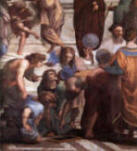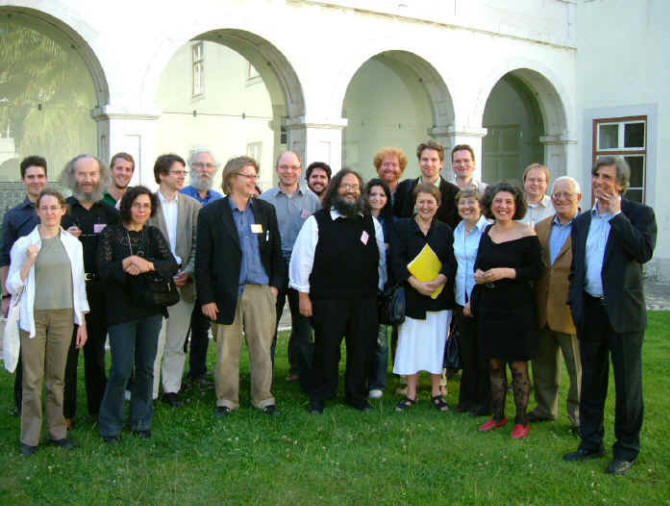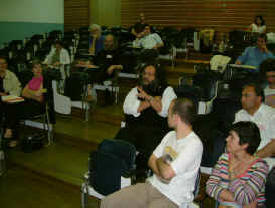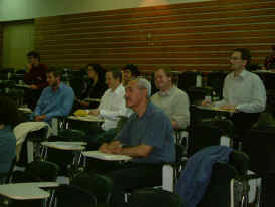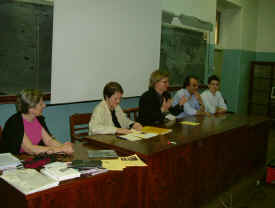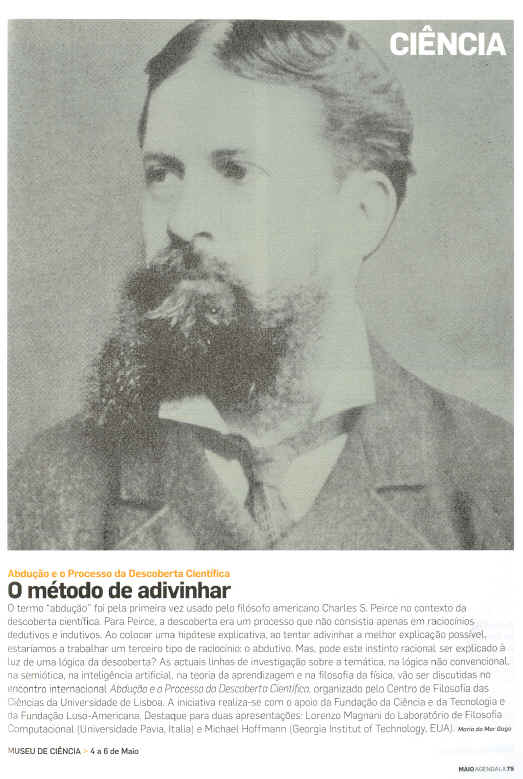|
Thursday 04.05.2006
|
|
|
|
|
8:30 |
Reception
|
|
9:30 - 9:45 |
Olga Pombo and Nuno Guimarães
Introduction to the International Meeting
|
|
|
Chairperson: Olga Pombo
|
|
Topic
1: Peirce and the Concept of Abduction
|
|
9:45
- 10:30 |
Shahid Rahman (Université Lille 3, France)
Abduction, Belief-Revision and Non-Normality
|
|
10:30
- 11.00 |
Nuno Nabais (Universidade de Lisboa, Portugal)
Abduction and Categories
|
|
11.00
- 11:30 |
Coffee break
|
|
11:30
- 12:00 |
Alexander Gerner (Universidade de Lisboa, Portugal)
Epistemic Attention and Abduction
Pasi Pohjola (University of Jyväskylä, Finland)
What is Abductive Method?
|
|
12:00
- 12:30 |
|
12:30
- 14:30 |
Lunch
|
|
Topic 2: Case studies on Abduction
(historical and epistemological)
|
|
14:30
-
15:00 |
Andrés Rivadulla (Universidad Complutense, Madrid, Spain)
Abductive Reasoning, Theoretical Models
and the Physical Way of Dealing Fallibly with Nature
João Luís Cordovil (Universidade de Lisboa, Portugal)
Are the Two Major Conceptual Moments of the
(Orthodox) Quantum Mechanics Moments of Abduction?
Albrecht Heeffer (Ghent University, Belgium)
Abduction as a Strategy for Concept Formation in
Mathematics: Cardano Postulating a Negative
Coffee break
Albert Schirrmeister (Humboldt Universität Berlin, Germany)
Johannes Kepler’s Dreams and Abductive Knowledge
Ana Paula Silva (Universidade de Lisboa, Portugal)
How can the Example of Kepler’s Great Scientific Discovery Illuminate the Problematical Nature of Abduction?
|
|
15:00
- 15:30 |
|
15:30
- 16:00 |
|
16:00
- 16:30 |
|
16:30
- 17:00 |
|
17:00
- 17:30 |
|
17:30
-
18:00
|
General Discussion
|
|
|
|
|
|
|
Friday 05.05.2006
|
|
|
|
|
|
9:30
- 9:45 |
Chairperson: Nuno Nabais
|
|
Topic 3: Processes of Scientific Discovery
|
|
9:45
- 10:30 |
Luís Moniz Pereira (Universidade Nova de Lisboa, Portugal)
Preferential Theory Revision – A Logic Program Approach

Joke Meheus (Ghent University, Belgium)
Adaptive Logics for Abduction and the Explication of Explanation-Seeking Processes
Coffee break
Diderik Batens (Ghent University, Belgium)
Formal Problem Solving Processes
Sami Paavola (University of Helsinki, Finland)
Abduction with Distributed Means
Lunch
|
|
10:30
- 11:00 |
|
11:00
- 11:30 |
|
11:30
- 12:00 |
|
12:00
- 12:30 |
|
12:30
- 14:30 |
|
Topic 4: Abductive
Strategies, Applications & Perspectives
|
|
14:30
- 15:15
|
Michael Hoffmann (Georgia Institute of Technology, U.S.A.)
Seeing Problems, Seeing Solutions.
Abduction and Diagrammatic Reasoning in a Theory of Learning and Creativity
José Augusto Mourão (Universidade Nova de Lisboa, Portugal)
Abduction and Metaphor
Coffee break
Elia Belli (University of Pavia, Italy)
Agent-Based Abduction, being Rational through Fallacies
Ahti-Veikko Pietarinen (University of Helsinki, Finland)
Abductive issues in the Proof of Pragmaticism
General Discussion
|
|
15:15
- 15:45
|
|
15:45
- 16:15
|
|
16:15
- 16:45
|
|
16:45
- 17:30
|
|
17:30
- 18:00
|
|
|
|
|
|
Saturday 06.05.2006
|
|
|
|
|
|
9:30
- 9:45 |
Chairperson: Alexander Gerner |
|
|
Topic 4: Abductive
Strategies, Applications & Perspectives
|
|
9:45
- 10:15 |
João Sampaio (Universidade de Lisboa, Portugal)
Clinical Reason in Medicine: The role of Abductive Inference
Willem F. G. Haselager (University Nijmegen, The Netherlands)
Abduction's Dark Ways
Coffee break
Dina Mendonça and Isabel Serra (Universidade Nova de Lisboa and Universidade de Lisboa, Portugal)
Abduction and Emotional Processes - a Taxonomy of
Emotional Processes in Scientific Discovery
Lorenzo Magnani (University of Pavia, Italy)
Multimodal Abduction. Neuronal Process, External Semiotic
Anchors, Hybrid Representations
Olga Pombo and Alexander Gerner
Closing Panel
|
|
10:15
- 10:45 |
|
10:45
- 11:15 |
|
11:15
- 11.45 |
|
11:45
- 12:30 |
|
12.30
- 13.00 |

![]()
![]()
